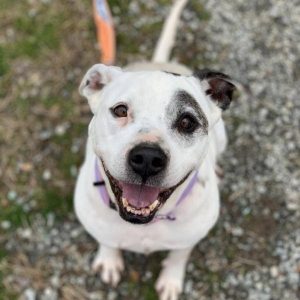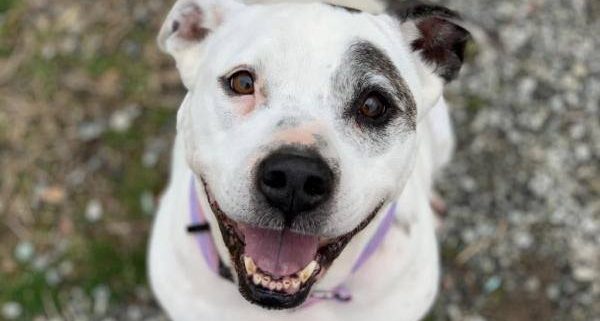Ask Crystal: Dealing with Anxiety

Dear Crystal,
We rescued a pit mix 3 years ago. She will occasionally potty in the house. She has very bad separation anxiety on top of sheer terror at the sound of fireworks and/or gunfire. She will run through the house opening doors and trying to find a place to hide. We have tried hemp oil and Composure Pro with no help. She pants and shakes for hours. Should we start with our vet for stronger medication or a behavioral specialist? We leave music on when we leave hoping that will help. I’m afraid she is going to have a heart attack from her anxiety. Thank you for any suggestions.
Sincerely,
Worried Dog Mom
Dear Worried,
I am so sorry to hear that your sweet pup has so much anxiety. It is so hard to see our beloved family members suffering. It is really important to address these issues so that you can make her life better and prevent things from getting worse. Dogs with one type of anxiety often will have additional anxieties so it is not unusual to have more than one issue. The separation-related behavior should be the main issue to address since that is something that occurs more often in her life.
There are trainers who specialize in separation anxiety-related behaviors. They will do an initial interview and ask a lot of questions of your dog’s history to determine how severe your dog’s separation-related behavior is and how to handle the training plan. They will also coach you along the way, day by day. They usually can offer video training sessions rather than needing in person sessions. Malena DeMartini is viewed as the expert in separation-related behavior training and has created an online training program. You can find more information here: Separation Anxiety Training Programs – Malena DeMartini.
The best-case scenario is that you would have a veterinary behaviorist working in conjunction with your Certified Separation Anxiety trainer and your regular veterinarian. Veterinary behaviorists are veterinarians that specialize in behavior. They understand what behavioral medications to use for different types of issues. They also understand that you must also have a training plan in place with a trainer or behavior consultant. Veterinarians that don’t specialize in behavior often don’t have a lot of information on how to use behavior medications or how to desensitize and counter conditions for new behavior. You can locate one at the American College of Veterinary Behaviorists: American College of Veterinary Behaviorists (dacvb.org).
Behavior medications are used to bring the dog’s anxiety levels to a level where the dog is able to think and learn. They take some of the edge off of the anxiety. They are not meant to be used alone and they alone will not solve a behavior problem. Some dogs need multiple behavior medications to get to a level where they are workable. It may or may not be something the dog always needs to take.
A video camera is going to be an important part of the diagnosis of the problem. It also helps determine how long the dog is able to be left alone before they become too anxious. You want to test this out with the dog loose in the house rather than in a crate. She doesn’t have to have the whole house but just not confined in a small area. You can also use your laptop and have a zoom meeting with yourself on the laptop and your phone. Act as if you are leaving the house. Grab your keys and walk out. You don’t want to go far away though; you need to be able to come back before the dog has a panic attack. Time how long until the dog starts showing high levels of anxiety. This will give you and your trainer a starting point.
You may also notice that your dog starts displaying anxiety when she notices your predeparture cues. Often, they will see us picking up our keys and putting on our shoes and they have that association that those things mean you are going to leave. The traditional advice is to make your comings and goings drama free so you aren’t adding to the dog’s anxiety with your own behavior.
It is critical that if she is diagnosed with separation related behavior, that she is never left alone while she is in the treatment longer than she can handle. That often means help from your friends and neighbors to watch her when you need to leave. You can also utilize dog day care or pet sitters to come spend time with her.
There are some things that you can be doing right away that may add some additional benefits to her behavior and may be something that will be included in her training and management plan. Start feeding her from enrichment feeders to add enrichment to her life. This can help burn some energy and give her things to occupy her while she is alone if she is able to eat while alone. Many dogs are too anxious to eat when left alone so it may be for now you are only giving these to her when you are home. Exercise and daily training are extremely important for burning excess energy. It helps to take the edge of the anxiety if we can be sure that we are meeting the dog’s exercise and enrichment needs. Every dog has different needs but starting at three fifteen-minute structured play sessions is a good starting place to see how much exercise she needs.
The accidents in the house may be related to her anxiety or they may not be. House training accidents can be a symptom with separation related behaviors if the dog is otherwise housetrained. If the dog only has accidents during being left alone, it could be related. Your dog trainer can help you determine if it is related or just a separate house-training issue.
In my experience, gunfire is a little harder to desensitize to where I live because I never know when it is going to happen and my dog may get inadvertently triggered. It is likely that the veterinary behaviorists will prescribe a daily medication for her which may help with the gunfire anxiety. The fireworks often need an additional short-term medication since we usually know when those are going to happen, we can prepare better.
Victoria Stillwell has a line of CD that can be used to desensitize and counter condition dogs with noise phobias. Canine Noise Phobia Series | Victoria Stilwell Positively She also has a calming cd in the series that may help some with the separation related issues. They are guided cd’s combining music, low levels of the noise triggers and food to desensitize and counter condition. It’s an expensive way to have someone guiding you through noise phobia training.
These issues can be overwhelming and difficult to handle on your own. I really encourage you to check out the resources I have provided to get started with a treatment plan. There are many different options depending on your financial situation so hopefully you can find the plan that works for you. There is help and you can change this behavior. Good luck!
Until next time,
Crystal
Submit your own pet behavior question for Crystal here:







